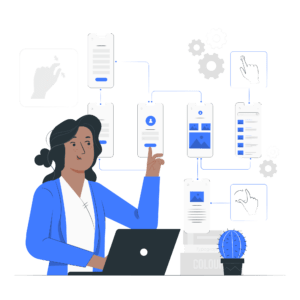Custom Healthcare Software Development Solutions
Develop and Launch Full-Cycle Complex Healthcare Solutions
Let Us Help You Design and Plan Your Entire Healthcare Software Ecosystem
Software is a vital component of any modern organization and can enable healthcare providers to streamline operations, achieve better outcomes, and improve patient care. To meet the unique needs of the industry, you need to ensure your software solutions are compliant, secure, and support interoperability. Our custom healthcare software development services can support your organization through each step of the process.
Custom Healthcare Software Development
Competitor Analysis
UX and UI Design
API and Integrations
Work Closely with Our Software Developers to Create the Best Healthcare Solutions
Our team can accompany you through each phase of healthcare software development, from gathering requirements to implementing custom solutions and supporting both healthcare operations staff and users. We can help you with:
- Market and competition analysis
- Architecture and API integration
- Healthcare solution rollout
- Compliant software and app development
- Workflow optimization
- Staff training and onboarding
- User experience design
- Visual identity and brand positioning
- Healthcare software maintenance and support
What is Custom Healthcare Software Development?
Custom healthcare software development is a multi-step process involving activities such as requirements gathering, design, coding, implementation, testing, maintenance, training, and support. Its goal is to ultimately create software that is tailored to the needs of your healthcare organization; for example, by addressing medical billing, patient engagement analysis, electronic health records management, revenue cycle management, and more.
Our Medical Software Development Services
Pronix Health specializes in EHR/EMR software development, practice management, workflow mobility, billing, telehealth, and revenue cycle. We can also help you develop different types of medical software, including solutions for imaging, laboratory, patient tracking, and various medical specialties, such as cardiology, oncology, or mental health.
We have helped a wide range of healthcare organizations, medical device manufacturers, and pharmaceutical companies achieve their software goals. Explore some of our service offerings for the healthcare industry below.
Requirements Gathering
Most projects, no matter their goal, begin with requirements gathering. This process, which collects and defines the functional and non-functional needs of a product, requires you to correctly identify the expectations of the different stakeholders involved – for instance, how various users, healthcare providers, and patients will use the medical apps.
Ultimately, the goal of the requirements-gathering phase is to ensure your healthcare software is designed around what a program is expected to do and how it will be used. In this particular industry, requirements gathering involves a deep understanding of all essential workflows, processes, and regulations. For example, it needs to take into consideration how patient information will be handled and stored. Many healthcare apps (including mobile apps) involve users accessing their own medical records and operating their patient data, as well as communicating with different healthcare providers, insurers, and regulatory bodies.

PronixHealth can cover all of these bases to ensure your product is compliant, secure, and does exactly what you want it to do. Our services include a combination of various techniques, such as interviews, focus groups, and surveys, to document all specifications and requirements.

UX & UI Design
UX (or User Experience) and UI (or User Interface) are two important aspects when it comes to healthcare software development, as they can help the software be more visually-appealing, user-friendlier, and easier to navigate.
Although similar in practice, there are two key differences between UX and UI. User experience design is a process that focuses on the user’s needs, expectations, and goals, which in healthcare software translates into creating interfaces (for apps, websites, etc.) that are both intuitive and functional. User interface design, on the other hand, focuses on the visual and interactive elements that make the program or solution; for example, the fonts, colors, and layout of the different screens or pages.
In healthcare software development, UX and UI are equally important to secure the success of a project, as they impact its efficiency and effectiveness. In other words, a well-designed medical software app that takes user experience and user interface into consideration will help providers access the information they require, communicate with patients and stakeholders, and make better-informed decisions.
PronixHealth’s healthcare software developers can help you address a range of activities, including user research, prototyping, and testing, and work alongside UX and UI designers to ensure your medical software meets the specific needs of the healthcare industry.
Custom Healthcare Software Development
The healthcare industry is rapidly changing and involves various regulations, workflows, and stakeholders. This is why developing custom software for healthcare can be a complex process, although one that is highly rewarding, too.
For one, your healthcare software solution or medical app needs to comply with a range of standards, such as HIPAA (Health Insurance Portability and Accountability Act) and GDPR (General Data Protection Regulation) – both of which can lead to legal and financial consequences if not correctly addressed. Software development companies also often need to collaborate closely with various stakeholders, such as healthcare providers, patients, and different types of users.

Because of the sensitive nature of patient information, custom healthcare software development must also have robust security measures in place. All health data needs to be protected against unauthorized access or breaches. Lastly, medical software development also needs to focus on user experience (taking into account the needs, workflows, and goals of various users) and integrations with other systems in your healthcare organization.
PronixHealth has the deep understanding that is required to develop user-centered, efficient systems and programs to enable healthcare organizations to deliver better care and improve outcomes.
Solutions Implementation and Testing
Implementation refers to the process of deploying and integrating healthcare software solutions into existing technology infrastructure. For one, developing all the features needed to have the solution working but also ensuring it’s correctly configured to meet the specific requirements of your organization.
In healthcare software development, implementation is a critical phase of the lifecycle because this is the point at which a program or app is put into use. Thus, it’s vital to guarantee it’s correctly planned, installed, configured, and tested. This last step, in particular, can ensure the software is working as expected and is meeting all the expectations of reliability, scalability, and security.
At Pronix Health, we do different key types of testing, including:
Functional testing
To cover requirements such as the ability to store and retrieve patient medical data (including patient engagement), support clinical workflows, and generate reports.
Performance testing
To measure the program’s ability to handle a large volume of data users and evaluate different conditions, such as peak usage times.
Integration testing
To make sure the solution can work with other systems and applications, electronic health records, APIs, etc.
User-acceptance testing
To see whether users and stakeholders understand how they can use the software.
Security testing
To guarantee data security for patient information, so it’s safe against unauthorized access, breaches, and threats.
You can work with our software engineers in real time to create unit tests, integration tests, and system tests and deploy your patient portal or solution into production.
Maintenance and Support
Once you have a healthcare solution running, the last step is to make sure the app or program continues to function as expected and can also meet the changing demands of the healthcare industry. This is where activities such as monitoring, optimization, and troubleshooting come into play.
As part of our maintenance and support services, we can help you keep on top of performance (to, for example, address issues such as slow response times, errors, or system crashes), fix bugs or defects, do security updates to detect and patch vulnerabilities and provide user support. We will also ensure your custom healthcare software development solution is correctly upgraded with new features and enhancements.
Our healthcare software development company will accompany you not just through planning and implementation but also by making sure you have everything you need to keep your solution running. PronixHealth will take care of all necessary training and maintenance, addressing all possible issues. You can choose the level and scope of support depending on the complexity of your software requirements and the size of your healthcare organization.
Our custom healthcare software development services can help your organization through all stages of development. Pronix Health’s team of professionals understands that modern healthcare requires the utmost quality of delivery. Contact us today to discuss your development needs.
Get in touch today to discover our Custom Healthcare Software Solutions
FAQs
Frequently asked questions about Custom Healthcare Software Development Solutions solutions.
Custom healthcare software development solutions are applications specifically designed and developed to meet the unique needs of healthcare organizations. These solutions can be developed for a variety of purposes, such as patient management, electronic health records (EHRs), medical billing and coding, telemedicine, and more.
Custom software can be tailored to the specific needs of the organization, which can help to improve operational efficiency and streamline workflows. These applications can also be designed to integrate with existing systems, which can reduce data entry errors and improve data accuracy. Lastly, custom healthcare software development can help to protect patient data and ensure compliance with regulatory requirements.
Typically, developing a healthcare software solution involves gathering requirements, designing, developing, testing, deploying, and maintaining the application.
Custom healthcare software offers numerous benefits, including improved accuracy and efficiency of medical processes, enhanced patient data management and security, simplified appointment scheduling and patient management, seamless integration with existing systems, and better accessibility to medical information for healthcare professionals.
Custom healthcare software solutions can enhance patient care by enabling real-time access to patient information, facilitating efficient communication among healthcare providers, automating prescription management and medication reminders, and supporting telemedicine services for remote patient consultations.
Custom healthcare software incorporates robust security measures such as data encryption, user authentication, role-based access control, and compliance with industry regulations like HIPAA. These measures help safeguard patient data and ensure privacy, preventing unauthorized access or data breaches.
Yes, custom healthcare software can be designed to seamlessly integrate with existing systems such as electronic health record (EHR) systems, laboratory management systems, billing systems, and more. This integration allows for efficient data exchange, reduces duplication of work, and enhances overall operational efficiency.
Yes, custom healthcare software solutions can be designed to be scalable, allowing them to adapt and accommodate future growth and changing needs. Scalability ensures that the software can handle increased data volumes, user traffic, and additional features as the healthcare organization expands.
Custom healthcare software development often utilizes technologies such as electronic health records (EHR), cloud computing, mobile app development, data analytics, artificial intelligence (AI), machine learning (ML), and blockchain for secure data management and interoperability.
To ensure successful implementation, it is crucial to partner with an experienced software development company specializing in healthcare solutions. Collaborate closely with the development team, define clear goals and requirements, conduct thorough testing and training, and provide ongoing support and maintenance for the software after implementation.
